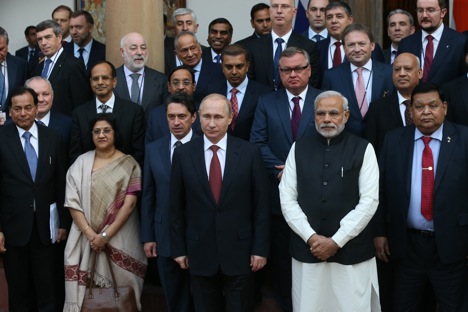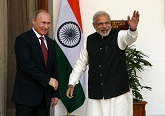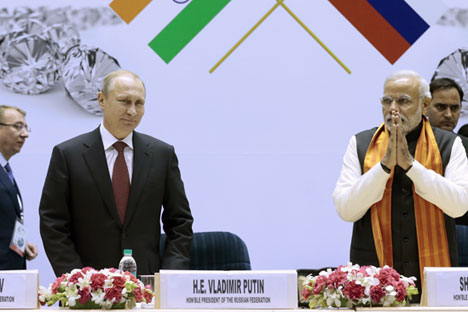Taming the Babus: biggest challenge for Modi and Putin

The two leaders Narendra Modi and Vladimir Putin are not only popular, but also have common aspirations to make their nations great. Source: Konstantin Zavrazhin / RG
President Vladimir Putin’s 22-hour long New Delhi visit and his extremely fruitful talks with Narendra Modi were crowned with the signing of 20 agreements, memoranda of understanding (MoUs) and commercial contracts.
However, the past experience shows that many good decisions taken at the summit meetings are virtually killed by the babus at the middle and lower level in the bureaucratic hierarchy in both Russia and India for various reasons, including lack of understanding about the importance of the other party for the nation or sheer ignorance.
I remember some time back an Indian ambassador in Moscow in a private conversation before an annual summit between the leaders of the two countries had complained about the problems created by the babus which the two principals would have to resolve.
Many of the agreements signed this year on hydrocarbons and nuclear energy would have been materialised long ago, if for unknown reason Indian babus had not inserted a clause about Russia’s obligations to inform about its energy cooperation projects in the finalised draft of the energy security partnership pact ready for signing during Prime Minister Atal Behari Vajpayee’s Moscow visit in 2001. Reportedly angry Kremlin had refused to ink it, leaving it to individual companies.
It was a tough time for Russia and the Indian babus thought Moscow will agree to anything. But the Indian diplomats, well aware of ground realities, felt betrayed by the babus at home, who had the knowledge of Russia only through prejudiced Western media coverage. The mentality to take Russia for granted as a cash strapped and mafia run-society was prevailing.
Unlike the Chinese buyers, infamous for copying, Russia had given Indians access to all its military industrial facilities working on New Delhi’s defence orders. However, New Delhi’s dilly-dally in inking the intellectual property right (IPR) forced the then Defence Minister Sergei Ivanov to openly rise this issue. In a pre-visit interview to Moscow-based Indian media in Moscow in 2004 Defence Minister Ivanov ruled out any further cooperation in cutting edge defence technologies until IPR in defence is signed by India. It later turned out that the file was gathering dust in the defence ministry in New Delhi after an undersecretary- level IFS official on deputation had put in on the backburner.
The Indian bureaucracy – the product of British Raj, still continues to view Russia through the eyes of erstwhile masters (largely due to the Western English language media being the sole source of information), without realising that these very Russians had built the second biggest empire and even after the Soviet collapse they are the world’s largest country in size.
Nevertheless, the Russians are also partly to blame for the strengthening of pro-West lobby in India, including in the armed forces and Defence Ministry.
The post-Soviet Russian chinovniks (babus) are not much better. The older generation of defence industry officials in the early post-Soviet period used to say about India ‘where they will go?’ But when the Indians looked towards Israel, the West and particularly at the US as new sources of defence supplies and Russia started losing one-after-another big ticket deals like multirole fighters and assault helicopters, they started crying ‘fowl’.
The new Russian administrative and business elite identify themselves only with the West and don’t give India due attention. Few years ago the two governments had appointed a Commerce Secretary-level Joint Study Group (JSG) to identify the bottlenecks in expanding bilateral trade.
At the end of the meeting of JSG, the Russian co-chairman in a private conversation with me said: “Russian businessmen’s families live in (West) Europe, over the weekend they fly to Europe to meet them and it takes only a couple of hours. They simply do not want to understand India.” “This is true for most of the chinovniks,” he added.
Things have changed for Russia under sanctions; things have also changed for India, which for the first time in three decades has strong government led by a highly popular prime minister, who means business.
The two leaders Narendra Modi and Vladimir Putin have many similarities: they are not only popular, but also have common aspirations to make their nations great. The biggest challenge today in bilateral relations for them is to tame their bureaucracies ‘to deliver’.
Otherwise, the India-Russia ‘privileged strategic’ partnership would remain only a topic of discussion for the security communities of the two countries.
All rights reserved by Rossiyskaya Gazeta.
Subscribe
to our newsletter!
Get the week's best stories straight to your inbox

